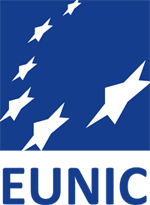European Union National Institutes for Culture
The European Union National Institutes for Culture (EUNIC) is a network of European national institutes of culture and national bodies engaged in cultural and related activities beyond their national borders. EUNIC brings together organisations from all 27 EU member states and adds value through its global network of clusters. By pooling together the resources and expertise of its members and carrying out joint work on common areas of interest, EUNIC is a recognized partner of the EU and its stakeholders in defining and implementing European policy on culture inside and outside the EU.
 EUNIC logo | |
Official language | English |
|---|---|
| Website | www |
Organization
The overarching purpose of EUNIC is to create effective partnerships and networks between the participating organisations, to improve and promote cultural diversity and understanding between European societies, and to strengthen international dialogue and co-operation with countries outside Europe.
Since its establishment in 2006, EUNIC has evolved into a strong network delivering transnational collaborative projects worldwide through its 36 members and 103 clusters. Members consist of national cultural institutions or organizations. Clusters are collaboration platforms established where at least 3 local offices of EUNIC members operate together. Clusters can operate nationwide or citywide. A EUNIC cluster represents the whole of EUNIC and not only those members present in a country or location.
On May 16, 2017 during Danish Presidency EUNIC and the European Union signed of an administrative agreement that outlines joint principles, values and objectives for cooperation as well as practical arrangements for its implementation.[1]
The Presidents are supported by the EUNIC Global office team based in Brussels. The EUNIC Global Office in Brussels also supports the work of EUNIC members and clusters around the world.
Management
EUNIC is managed by a bi-annual meeting of the Heads of its member organisations (General Assembly). They elect from among themselves a President, a Vice President, and four ordinary members who together represent the EUNIC Board of Directors.
Presidencies

.svg.png)

Members of the Board of Directors of the Danish Presidency: President Michael Metz Morch[4]- Danish Cultural Institute; Vice-President Koen Verlaeckt - Flanders Department of Foreign Affairs; Johannes Ebert - Goethe-Institut; Anne Grillo - French Ministry of Foreign Affairs and International Development; Teresa Indjein[5] - Austrian Federal Ministry for Europe, Integration and Foreign Affairs; Małgorzata Wierzejska[6][7] - Ministry of Foreign Affairs, Poland


Members
Current members of EUNIC (March 2019)[8]


.svg.png)


























References
- "Administrative arrangement signed between EUNIC and the European Union". EUNIC.
- "Meet the people of EUNIC: Augustin Favereau, president of EUNIC" – via www.youtube.com.
- "Flanders president of EUNIC". www.fdfa.be.
- "EUNIC Generalforsamling i København -".
- "EUNIC – BMEIA, Außenministerium Österreich". www.bmeia.gv.at.
- "Ministerstwo Spraw Zagranicznych - Portal Gov.pl".
- https://www.msz.gov.pl/pl/polityka_zagraniczna/dyplomacja_publiczna/posiedzenie_walnego_zgromadzenia_sieci_eunic_;jsessionid=D12FD076380FCF8275594439168E92B9.cmsap1p
- https://www.eunicglobal.eu/members